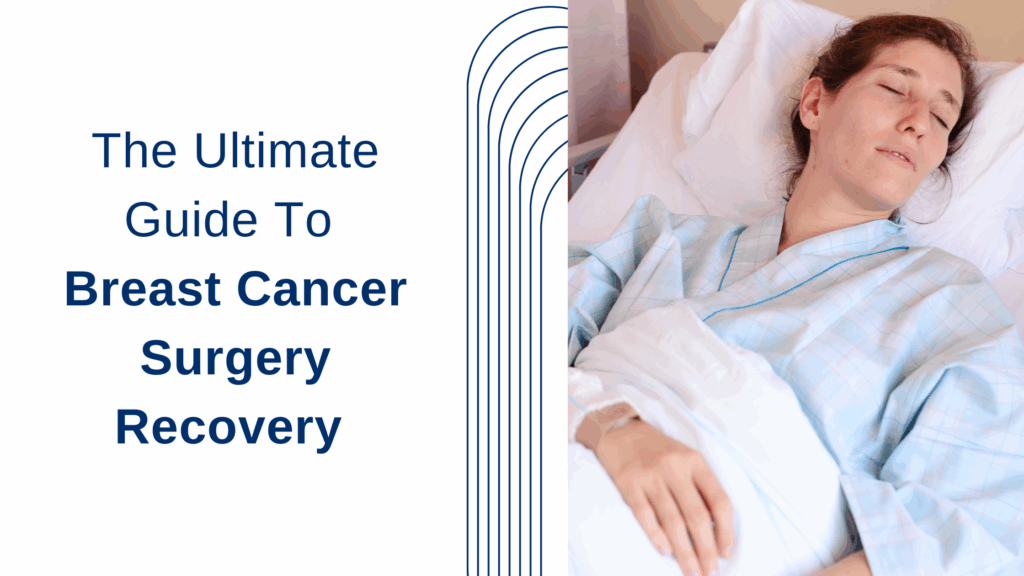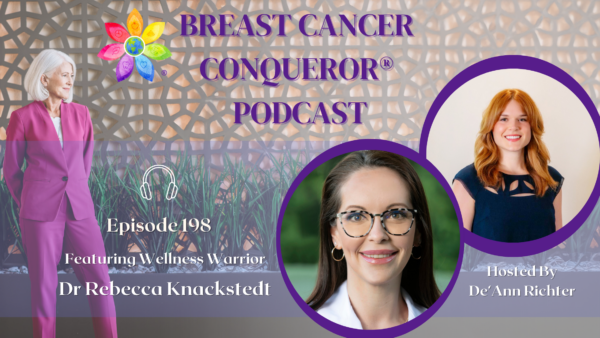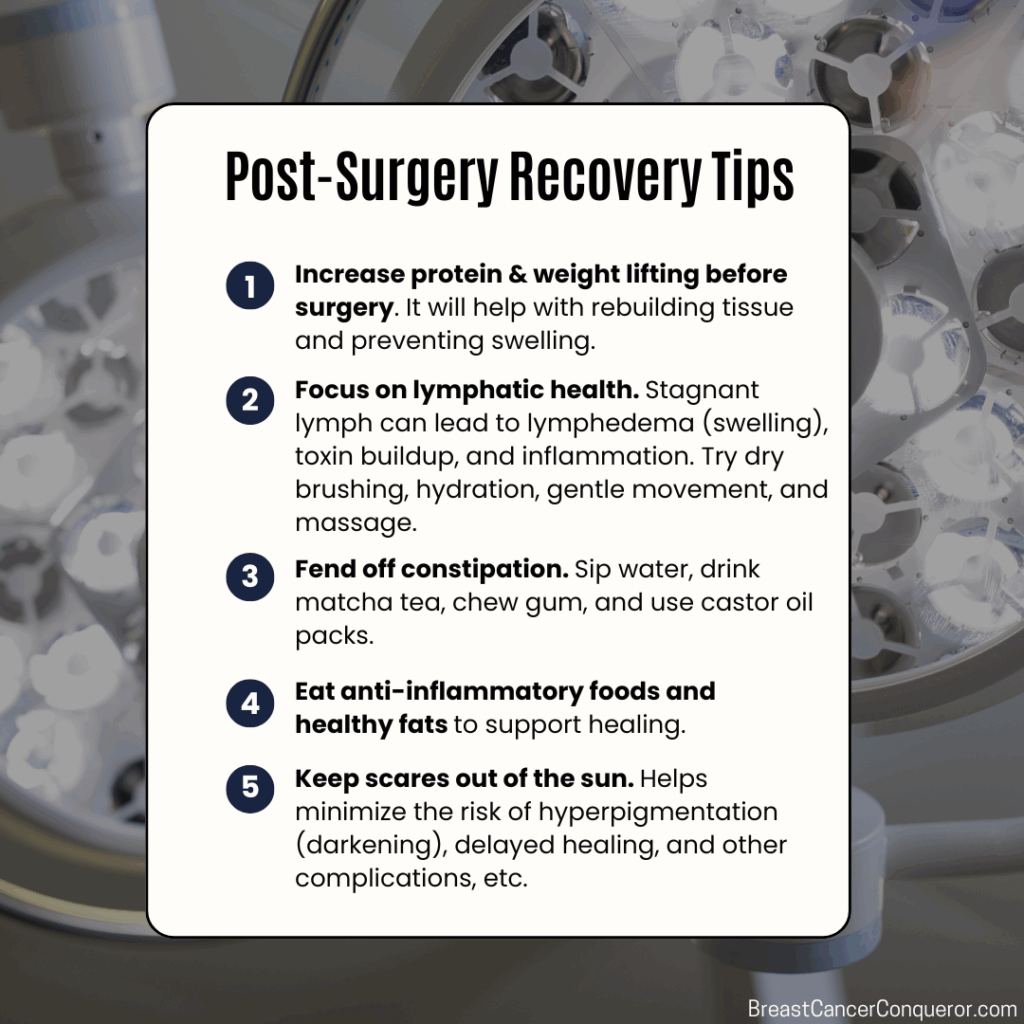
Please note: This guide is filled with information and integrative health insight for a general audience. Always follow your doctor’s specific instructions and talk to your medical team before trying anything new.
Quick Read:
- Prepare for your surgery by increasing protein and weight lifting.
- The week after surgery, focus on gentle-loving care such as managing drains, wearing a post-op bra, lymphatic health, fending off constipation, packing in the protein and healthy fats, and most importantly: letting people help you!
- In the next several weeks, focus on consciously lowering stress levels, taking advantage of acupuncture, deep sleeping, sticking with an anti-inflammatory diet, and getting support from friends and family.
Surgery. Whether it is lumpectomy, mastectomy, reconstruction, or node removal, it’s a big mountain you must conquer. But whether you are climbing up (planning and preparing your body) or on your way down (recovering and moving forward), we are here to be your integrative health sherpa.
Use this blog post as your sage guide to making confident and informed decisions during your surgical journey so that it can be a time of recovery, restoration, and renewal.
Prehabilitation. 
Just as a hiker prepares to scale a massive mountain with training, nutrition, mindset, research, and so forth, you should do the same. For a deep dive into preparing for surgery (and recovery), please listen to this podcast episode with integrative health surgeon Rebecca Knackstedt, MD, Ph.D.
The episode is jam-packed with helpful tips, but here are Dr. Knackstedt’s top two suggestions:
- Increase your protein and weight lifting. Your body will be in a state of recovery and will need amino acids to rebuild tissue. Skipping on protein can lead to fatigue, swelling, and even wound breakdown. Additionally, your body needs fuel after surgery to heal, so it will break down the protein in your muscles, which is why you need more reserves. Also, let’s be realistic: after surgery, you won’t be hitting the gym right away, so being able to work out beforehand to give your body an extra boost when it needs it most is essential.
- Normalize the fact that you are stressed out and let it off your chest (literally). Claim it. Of course, you’re stressed and not sleeping well before a major surgery. This is totally normal. Just giving yourself permission to acknowledge you are scared and worried can sometimes help you let it go or seek out the support you need. Research has proven that fear of surgery, anxiety about the unknown, and concerns about postoperative pain can all intensify pain signals, making patients feel more pain and thus require more narcotics. The more you normalize, the less stressed you will be and the better your outcome will be.
Her last tip, but one, you will thank yourself later for: remember to wash and do your hair before surgery. Not because you need to look good, but because it may be the last time you can easily wash your hair for several days. It’s the little things that also matter.

The First Week(s) Post-Surgery: Focus on Gentle, Loving Care
These first few days or even weeks may be rough, but remember that every day you are getting a little bit better. Nourish your body, mind, and soul, and never feel shy about relying on your support team. Here are a few things we suggest:
What to do:
- Move when you can, but gently. Short walks and slow body movements can prevent stiffness, blood clots, and lymphatic issues. However, always listen to your body

Dr. V doing a FLOWpresso® session at the Healing Diva Elite Retreat and your doctor’s specific instructions.
- Manage drains if you have them. Your surgical team will give you specific instructions on how to empty and measure output. It’s not glamorous, but it’s important.
- Wear a post-op bra. The right bra can make a world of difference in how you feel. We love The Healing Bras, which were created by women who have walked this path and understand the emotional and physical needs of post-surgical support. They’re soft, wire-free, and designed to promote healing and comfort with warm or cool compression packs. You can hear more about them via this podcast episode.
- Let your lymphatic system freely flow. Lymphatic flow is critical post-surgery, especially if lymph nodes were removed. Stagnant lymph can lead to lymphedema (swelling), toxin buildup, and inflammation. Try dry skin brushing, sipping water throughout the day for optimal hydration, and gentle movements. If possible, try healing therapies such as manual lymphatic massage or FLOWpresso®, which will be offered at the Healing Diva Elite Retreat this October.
- Let people help you. Rely on your village. People want to help you; let them.
What to eat:
- Fend off constipation. Pain meds, anesthesia, and decreased activity can all lead to constipation misery. Therefore, do these things to prevent is: sip water all day to stay hydrated, drink caffeine such as matcha tea as it stimulates colon muscles, chew gum to increase intestinal activity and gastric juices, and gently massage your abdomen (if it wasn’t part of your surgery). Castor oil packs may also help get things easily flowing.
- Pack in protein. As stated above, post-surgery protein is crucial for recovery. Amp up on clean protein to reduce fatigue, swelling, and wound breakdown. To learn more about the types of protein to eat and why it is also necessary for preventing osteoporosis, please read this blog post.
- Indulge in anti-inflammatory vegetables. Think of vegetables as your body’s internal clean-up crew. They help flush out toxins, reduce swelling, and support lymph flow. A few we recommend are: cruciferous (broccoli, Brussels sprouts, cauliflower, etc.), leafy greens (kale, spinach, Swiss chard, etc.), and, really, any vegetable will do. If you don’t want to spend your days buying, chopping, cooking, and eating broccoli, just take a few capsules of Brocco Power. One capsule equals 500 grams of broccoli!
- Heap on the healthy fats. Flax seeds, chia seeds, olive oil, and avocados are all fantastic ways to nourish your body with anti-inflammatory support, post-surgery, and every day afterwards!
The next several weeks and months: Bounce back even better!
There are several steps you can take to recover from surgery in a vibrant, healthy way. Below are a few ideas to consider in the weeks and months post-op.
- Indulge in retail therapy! We mean it. There are cute, functional, and comfortable bras and swimsuits designed specifically for your new changes. Click here to uncover what you should know when buying a post-surgery bra and swimsuit.
- Keep your surgical scars (or symbols of strength!) out of the sun. To minimize the risk of hyperpigmentation (darkening), delayed healing, and other complications, try to keep scars out of direct sun. If that is not possible, then cover them with sunscreen.
- Take advantage of acupuncture. This ancient practice has been studied to support a wide range of recovery needs, including reducing pain and swelling, preventing scar tissue and bruising, boosting mood and relaxation, and potentially improving the lymphatic system.
And what you should do always and forever…
- Consciously lower stress levels. Surgery, massive changes in routine, and anxiety about the future can bring boulders of stress and trauma into your path. But managing your stress is more than just feeling lighter; it should be a focus of your healing, since your thoughts and emotional wounds can create biochemical changes in your body that literally “turn off” the cancer-promoting genes. To learn how to consciously lower your stress levels, please read this blog post.
- Gentle movement and stretching. Keep your blood, energy, and muscles moving in any way that feels good for you.
- Stick with an anti-inflammatory diet. Inflammation comes with surgery, so intentionally reducing it with your diet can be a powerful healing tool.
- Sleep. It’s one of the best ways to speed up recovery, manage mental health, and prevent future health issues. To find out how to put yourself into a deep, restorative sleep every night, please read this blog post.
- Continue to let your friends and family support you. Think of it this way: Friends are like a good bra—they are close to your heart, provide support, and lift you up! Let them support your healing with the practical help (taking kids to the park so you can rest, bringing dinner, doing your laundry), and be part of deeper work: the love, care, empathy, and emotional support that provide the hope and strength you need for recovery.
 Your Next Chapter
Your Next Chapter
Surgery may be a big step in your healing journey, but it certainly is not the end of it. Actually, it may just be the beginning of living that big, beautiful, healthy life you have always dreamed of!
If you have not completed our on-demand course: Conquering Breast Cancer Together—A Balanced Approach to YOUR Healing Journey…now is the time! This “virtual retreat” is for anyone who wants to trade fear and confusion for confidence and clarity in their healing journey. Get ready for non-stop “Ah-Ha!” moments!
And remember, no matter the path you choose, we are here for you—so that you never have to fear cancer again!